Words of Wisdom - Shastra
& Shastrakaras speak
For Books and shastra downloads see Main Index, under
Books:
Om Namo Bhagavate Vasudevaya
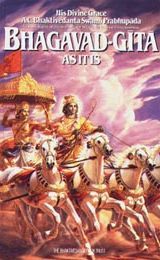

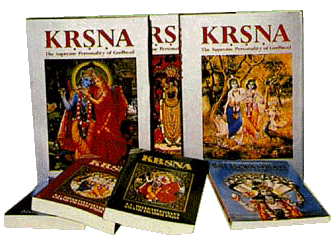
The Complete Works of Srila Prabhupada
All the books, the letters and conversations at your
fingertips
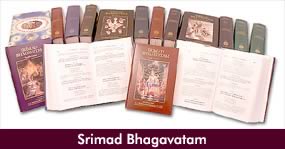
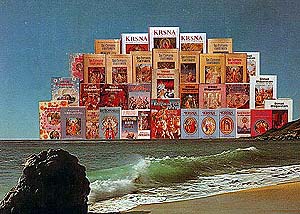
All Srila Prabhupada's books and more on one disk
http://www.vedabase.com




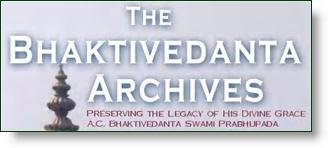
Srila Prabhupada's Audio lectures to listen to on-line:
http://www.hare-krishna.org/srila-prabhupada-lectures.htm
Listen to Srila A.C. Bhaktivedanta Swami Prabhupada on-line
- all 900 of his lectures are available HERE:
http://www.prabhupadavani.org/
Srimad Bhagavatam - the entire lecture series listen and
read along on-line - Narrated by Amala Bhakta dasa:
http://www.prabhupadavani.org/SB_index.html
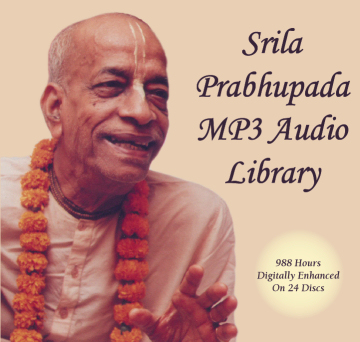
The new enhanced Prabhupada MP3 series
http://www.prabhupada.com/store/store.php?page=product.php&id=MP3AUDIOLIB

Srila Prabhupada Vyasa-puja book 2007
http://www.krishna.com/node/1048
Vyasa-puja is an annual celebration by the devotees of Lord Krishna
to offer homage to their guru, or spiritual teacher.
There are two versions of the Vyasa Puja Book based on the speed of
your internet connection.
If you are unable to open the file, download Acrobat Reader.
High speed connections, with pictures.
Vyasa-puja
Book 2007 [PDF/ZIP, 2.11MB]
Low speed connections, no pictures.
Vyasa-puja
Book 2007 (no pictures) [PDF/ZIP, 2.11MB]








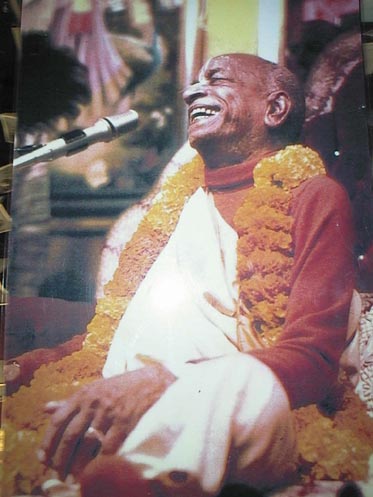
Visit "Prabhupada Connect" for all manner of Prabhupad
Nectar:
http://www.prabhupadaconnect.com/Index.html
Srila Prabhupada's Final Lesson Video - Downloadable and
viewing on-line
http://users.iskconludhiana.com/images/thumbnails.php?album=21


All Srila Prabhupada's original books
available for sale here.

Download all the Hare Krsna teachings which includes
all Vaisnava and
Vedic concepts by visiting one of the sites listed at
the following address.
http://www.geocities.com/suci123/bookdownloadsites1.html
The Bhaktivedanta Book Trust
Srila Prabhupad Memorial Library
http://www.krishna.com/main.php?id=33


33 Books Online Including Srimad Bhagavatam!
http://www.geocities.com/freeprabhupadabooks
The compressed "self extracting" file mentioned is now currently
available for download
http://www.krsnaconsciousness.org/Gauranga/Folio/BhaktivedantaVedabase_DOS.exe

Download or Listen to Prabhupad Bhajans HERE:
http://www.prabhupadavani.org/web/text/Bhajans.html


On-line 1972 McMillan edition - Bhagavad Gita As It Is:
http://www.asitis.com/

Bhagavad Gita AS IT IS on-line through the Tirupathi
Balaji site:
http://www.bhagavad-gita.us/

Bhagavad Gita Study guide on-line book:
http://chantandbehappy.com/gita/studyguide/StudyGuide-main.htm
Bhagavad Gita Study guides by numerous Iskcon devotees
- FREE downloads:
http://www.veda.harekrsna.cz/library/#3

All the Scriptures you'd ever need 4 FREE
http://www.hknet.org.nz/index-books.htm
http://www.hknet.org.nz/DDB.htm
http://www.hknet.org.nz/DDB2.html
last updated 4th August 2003


Srimad Bhagavad Gita AS
IT IS
Bhagavad Gita: Chapter
6 - Dhyana-yoga
TEXT 41
prapya punya-krtam lokan
usitva sasvatih samah
sucinam srimatam gehe
yoga-bhrasto 'bhijayate
WORD FOR WORD
prapya--after achieving; punya-krtam--of those who performed
pious activities; lokan--planets; usitva--after dwelling; sasvatih--many;
samah--years; sucinam--of the pious; sri-matam--of the prosperous; gehe--in
the house; yoga-bhrastah--one who has fallen from the path of self-realization;
abhijayate--takes his birth.
TRANSLATION
The unsuccessful yogi, after many, many years of enjoyment
on the planets of the pious living entities, is born into a family of righteous
people, or into a family of rich aristocracy.
PURPORT
The unsuccessful yogis are divided into two classes: one
is fallen after very little progress, and one is fallen after long practice
of yoga. The yogi who falls after a short period of practice goes to the
higher planets, where pious living entities are allowed to enter. After
prolonged life there, one is sent back again to this planet, to take birth
in the family of a righteous brahmana vaisnava or of aristocratic merchants.
The real purpose of yoga practice is to achieve the highest
perfection of Krsna consciousness, as explained in the last verse of this
chapter. But those who do not persevere to such an extent and who fail
because of material allurements are allowed, by the grace of the Lord,
to make full utilization of their material propensities. And after that,
they are given opportunities to live prosperous lives in righteous or aristocratic
families. Those who are born in such families may take advantage of the
facilities and try to elevate themselves to full Krsna consciousness.
His Divine Grace A.C. Bhaktivedanta Swami Prabhupada
Copyright 1983 The Bhaktivedanta Book Trust International. Used with
permission.

Bhagavad Gita As It Is - http://www.asitis.com/
Bhaktivedanta Vedabase - Bhagavad Gita on-line http://bhagavadgitaasitis.com/
Bhaktivedanta VedaBase: Bhagavad-gita As It Is http://vedabase.net/bg/en
Bhagavad Gita Multi Media Web-version http://chantandbehappy.com/gita/
Listen to Bhagavad Gita on line - http://www.Gitamrta.org
View our Bhagavad Gita Overview:
http://www.hknet.org.nz/BG.html
Archive: http://www.cs.rice.edu/~vivek/btg/archive/
Home Page: http://www.cs.rice.edu/~vivek/btg/
Join Bhagavad Gita eGroups HERE
mailto:bhagavad_gita-owner@egroups.com


Prabhupada Uvacha:
(here's some nectar, sometimes it comes in the form of Srutakirti prabhu's
diary, other times from Govinda dasi's diary, Hari Sauri prabhu's Transcendental
Diary, Bhurijan prabhu's book, or sometimes from a letter, or other related
source, but still nectar...)
Cold place is a symptom of sinful life
When we were in Toronto he had told Subhavilasa
that a cold place is a symptom of sinful life. He made a practical observation
about the weather in West Virginia. "Now here, in this quarter, sun also
rising very nicely. Formerly it was not so bright. Due to this Hare Krsna
chanting, sun is giving light. Is it not?"
Kirtanananda Maharaja confirmed it. "It is a fact."
"The more people will be sinful, the place will
be dark with cloudy. Nature will always disturb. They will not be happy.
It is not possible. This is the only way to become happy. So, so far as
possible, I have given you some framework. Now you fill up. Make it a nice
building."
Even when I mentioned to Srila Prabhupada a little
dubiously that the New Vrindaban devotees still buy their vegetable bhoga
from the local markets and it did not seem that they very self-sufficient,
Prabhupada maintained his positive mood. He said it was all right -- they
have the intention, and that is what is required. He repeated what he said
in Los Angeles, that Kirtanananda is putting into practice all the ideas
he has given.
We began discussing the scientists and their bluffing
again and Prabhupada told us a funny story about Gopala Ban, a court jester
in West Bengal during the reign of Raja Krsnacandra. By it, Prabhupada
cleverly illustrated how scientists obtained their grants. "The Mohammedan
Governor of the day had asked him, 'Now, Gopala Ban, I have heard you are
very expert. Can you write a similar book as the Mahabharata about my kingdom?'
"'Oh yes, why not? That is not difficult.'
"So he took with him some hundreds of thousands
of rupees and again came. 'Give me another ten thousand,' and another ten
... in this way.
"'When will the book be finished? You have taken
so much money.'
"'It is just on the verge of being finished.'
Then when he saw that no more money can be taken,
'I have taken so much money ... ' he said, 'Now sir, one information is
very essential. Give me and Mahabharata will be finished. Everything is
there.'
"'What is that information?'
"'Now, your wife, how many husbands she has got?'
"'This is nonsense!'
"'Eh? Well, that is the main subject matter of
Mahabharata. Draupadi had five husbands [the Pandavas], and you are such
a great person your wife must have at least one dozen. Otherwise, how Mahabharata
will be written?'
"'It is the subject matter of... ?'
"'Yes, that is the only subject matter -- that
Draupadi had five husbands. So you are such a big Nawab, your wife must
at least have one dozen. So give me their names.'
"So he became very angry. 'Don't talk this nonsense!'
"'Then I cannot finish your Mahabharata. I have
already invested!'
"So he took another ten thousand rupees and [the
Nawab] he said, 'Stop all this nonsense. That's all right.'"
Srila Prabhupada was laughing all the way through
his telling of it, making comical gestures as he relayed the foolishness
of the Nawab and the sharp wit of Gopala Ban in taking advantage of his
combined ignorance and pride.
"So these rascals," Prabhupada said, meaning the
scientists, "they are writing Gopala Ban's Mahabharata, and the rascal
government is paying them. They will never be able to produce anything.
Challenge them. As soon as you say, 'Make an egg' -- 'That we cannot say!'
And they'll chant 'Chemical evolution, chemical evolution' and get Nobel
Prize. Rascals. But how the people are so foolish that they believe in
this?
Prabhupada repeated his challenge to the scientists
to make an egg and produce life. It is something he has said many times.
"This is very simple. You see everything, white and yellow. Produce. Chemicals
are white. Some chemicals are yellow also. Just like hydroform ... It is
yellow. And soda bicarb, white, or potash cyanide is white. So you have
got so many chemicals, combine and pack it in a cell, and put underneath
the incubator. Why rascal do not do this?"
He emphasized the great fraud they are engaged
in. "Beat them with shoes. 'Rascal, you are cheating in this way.' Beat
them with shoes. That's all. That is the only punishment. Hundreds of men
demand them, that 'Do it, otherwise don't talk nonsense. If you talk nonsense,
then we will beat you with all our shoes.' Then they'll stop all this nonsense
talk. There is no punishment for their cheating and taking money."
Although his rhetoric was very strong, his tone
was devoid of any envy or hatred. In one sense, as a self-realized soul,
he is a neutral observer. But in another sense, as Krsna's representative,
out of compassion for the suffering conditioned souls, he cannot refrain
from condemning the perpetration of illusion which keeps them firmly bound
to the material world.
- From the "A Transcendental Diary Vol 3" by HG
Hari Sauri dasa
To receive little snippets of nectar like this on a daily basis subscribe
HERE: or If you want to introduce anyone else in reading Srila Prabhupada
Nectars, please send their eMail addresses to mailto:krpamaya_gauranga@hotmail.com
Please Chant:
 Hare
Krishna Hare Krishna Krishna Krishna Hare Hare
Hare
Krishna Hare Krishna Krishna Krishna Hare Hare
 Hare
Rama Hare Rama Rama Rama Hare Hare
Hare
Rama Hare Rama Rama Rama Hare Hare
...................and be Happy

Listen to Srila Prabhupad on-line
....a different lecture, morning walk, conversation or
class daily.
"Our Condition--Precarious"
Srimad-Bhagavatam 1.7.8
Vrndavana, September 7, 1976
Listen to the entire lecture on-line:
http://prabhupadaradio.com/M3U/Bhagavatam/m3u_II/SB116.m3u
Prabhupada: He's not here? Pandita? Where he is?
Hari-sauri: Oh, he's here.
Prabhupada: Read it. (hums)
Pradyumna: (chants om namo bhagavate vasudevaya) Yasyam?
Prabhupada: No, that is finished. Number three. Number
eight.
Pradyumna:
sa samhitam bhagavatim
krtvanukramya catma-jam
sukam adhyapayam asa
nivrtti-niratam munih
"The great sage Vyasadeva, after compiling the Srimad-Bhagavatam
and revising it, taught it to his own son, Sri Sukadeva Gosvami, who was
already engaged in self-realization."
Prabhupada:
sa samhitam bhagavatim
krtvanukramya catma-jam
sukam adhyapayam asa
nivrtti-niratam munih
So this samhita... Samhita means Vedic literature. There
are many rascals, they say that "Bhagavata was not written by Vyasadeva,
it was written by some Bopadeva." They say like that. Mayavadis, the Nirisvaravadi.
Because although Nirisvaravadi, or Mayavadi leader Sankaracarya, he wrote
comments on Bhagavad-gita, but he could not touch Srimad-Bhagavatam, because
in the Srimad-Bhagavatam the things are so nicely set up, krtvanukramya,
that it is not possible by the Mayavadis to prove that God is impersonal.
They cannot do it. Nowadays they are doing, reading Bhagavatam in their
own way, but that does not appeal to any sane man. Sometimes I have seen
a big Mayavadi is explaining one verse from Srimad-Bhagavatam, that "Because
you are God, therefore if you are pleased, then God is pleased." This is
their philosophy. "You do not require to please God separately. So if you
are pleased by drinking wine, then God is pleased." This is their explanation.
Therefore Caitanya Mahaprabhu has condemned this Mayavadi commentary. Caitanya
Mahaprabhu has said, mayavadi-bhasya sunile haya sarva-nasa. Mayavadi krsne
aparadhi. He has plainly said. No compromise. The Mayavadis, they're great
offender to Krsna. Tan aham dvisatah kruran, Krsna also says. They're very,
very envious to Krsna. Krsna is dvi-bhuja-muralidhara, syamasundara, and
the Mayavadi explains that "Krsna has no hand, no leg. This is all imagination."
How much offensive it is they do not know. But to warn people like us,
Caitanya Mahaprabhu has plainly warned that "Don't go to Mayavadis." Mayavadi-bhasya
sunile haya sarva-nasa. Mayavadi haya krsne aparadhi. This is the statement
of Sri Caitanya Mahaprabhu.
So you should be very, very careful. Don't go to hear
any Mayavadi. There are many Mayavadis in the dress of Vaisnavas. Sri Bhaktivinoda
Thakura has explained about them, that ei 'ta eka kali-cela nake tilaka
gale mala, that "Here is a follower of Kali. Although he has got a tilaka
on the nose and neck beads, but he's a kali-cela." If he's Mayavadi, sahaja-bhajana
kache mama sange laya pare bala. So these things are there. You have come
to Vrndavana. Be careful, very careful. Mayavadi-bhasya sunile. There are
many Mayavadis here, many so-called tilaka-mala, but you do not know what
is there inside. But great acaryas, they can find out.
sruti-smrti-puranadi
pancaratra-vidhim vina
aikantiki harer bhaktir
utpatayaiva kalpate
[BRS 1.2.101]
They create disturbance only. Therefore we have to follow
the Gosvamis, Gosvami literature, especially Bhakti-rasamrta-sindhu, which
we have translated in The Nectar of Devotion, every one of you should very
carefully read and make progress. Don't be victimized by the Mayavadi so-called
Vaisnava. It is very dangerous.
Therefore it is said, sa samhitam bhagavatim krtvanukramya
catma-jam. It is very confidential subject matter. He taught it, instructed
to Sukadeva Gosvami. Atma-jam. Like father, like son. There is no difference
between son and disciple. Canakya Pandita has equalized,
lalane bahavo dosas
tadane bahavo gunah
tasmat putram ca sisyam ca
tadayen na tu lalayet
That is the, I mean to say, Vedic system -- to teach the
son and teach the disciple. If one cannot teach the son -- the son is disobedient
-- he should give up his family life. Otherwise a father is in obligation
to teach the son properly. But if it is not possible... Sometimes it so
happens as family members, they do not take care. Otherwise Vyasadeva's
son is expected to become Sukadeva Gosvami. If not, such family connection
should be given up. Anukulyasya sankalpah pratikulyasya varjanam. Family
life, if it is favorable for advancing Krsna consciousness, it should be
accepted; otherwise it should be rejected. Anukulyasya sankalpah pratikulyasya
varjanam.
So what was the qualification of Sukadeva Gosvami which
induced Vyasadeva to teach him this samhitam? Sukam adhyapayam asa nivrtti-niratam:
he has no more attraction for material world. That is the qualification.
Nirvrtti. There are two kinds of life: nirvrtti and pravrtti. Pravrtti
means materialistic, karmis. Generally karmis, they have got tendency to
enjoy this material world. That is called pravrtti. Pravrtti-marga. Pravrttes
tu... Pravrtti is natural inclination. Anyone who has come to this material
world... Pravrttir esa bhutanam. Everyone is in the pravrtti-marga. What
is that pravrtti-marga? The pravrtti-marga is these things: sex, meat-eating,
intoxication, like that. This is pravrtti-marga. Pravrttir esa bhutanam
nivrttes tu maha-phalam. So the whole Vedic literature is there how to
make him stop this pravrtti-marga. That is the whole plan. Otherwise there
are many instances, loke vyavayamisa-madya-seva nityas tu jantuh. Nitya.
A jantuh, he's called jantuh. Jantuh means animal or no intelligence. Those
who are jantuh, they have got this tendency. Pravrttir esa. What is that?
Vyavayamisa-madya-seva: sex and meat-eating. Amisa, meat, egg, fish; and
madya, intoxication. This is pravrtti. Loke vyavaya. Vyavaya means sex.
Amisa-madya-seva nitya tu jantuh. Jantuh means living being, conditioned
in the material world, they have got this general tendency. Pravrtti. You
will find in animals, in birds, in beasts, and beastly human being, two-legged
beast... There are four-legged beasts and two-legged beasts. Four-legged
beasts are the animals -- cats, dogs, tigers, etc. Cows, asses. They are
four-legged beasts. And there are two-legged beasts, dvi-pada-pasu. It
is not manufactured; it is there in the sastra. Dvi-pada-pasu. Dvi means
two, and pada means legged. So any human being who is attached to this
pravrtti-marga -- sex, meat-eating, intoxication, gambling -- he is dvi-pada-pasu,
two-legged animals. This is pravrtti-marga.
Therefore education should be in such a way planned that
he should be nirvrtti-marga. Pravrttir esa bhutanam nirvrttes tu maha-phalam.
These are general tendency for the conditioned soul. But if anyone can
control by training by education these things -- vyavayamisa-madya-seva:
sex life, intoxication and meat-eating -- then he's called niratam. He
becomes qualified. Vyasadeva preferred to teach Srimad-Bhagavatam to his
son Sukadeva Gosvami because he was niratam, nivrtti-niratam. He was engaged.
From the very beginning of his life, as soon as he was... It is said for
sixteen years within the womb of his mother, he did not come out purposefully
so that he may not be materially attached. Because a small child, the baby
comes out from the mother's womb. Within the womb, when he's in suffering,
he prays to God, "This time kindly release me. Now I shall begin bhagavad-bhajana."
One who is little advanced in his previous life... Because it is very,
very terrible condition within the womb of the mother. We have forgotten.
But we can imagine, if you are packed up in a bag and put hand and legs
tightly knotted, just imagine. You cannot live even for three minutes.
They say if you are airtight packed-up like that, as we are put into the
womb of the mother, we cannot exist more than three minutes. But we existed
by the mercy of Krsna. Only by the mercy. That is also nowadays very dangerous.
In that packed-up condition, he's there, he's already suffering, and the
mother is planning to go to the doctor and kill the child. Just imagine
how precarious condition in the womb of the mother. And if we do not try
in this life that "I shall not again enter into the womb of the mother,"
then what is the value of this life? We have to learn it from the sastra.
You cannot see actually, but the medical science explains that a child
is placed in this way. In Bhagavata also it is stated how the child grows
his body, how it is put into that precarious condition.
So one should be senseful, that "So much suffering awaiting..."
Tatha dehantara-praptih. And Krsna says, "You have to accept another body."
Not that death is finish. They have made it a very easy formula, that after
death everything is finished -- because they are rascals. They do not take
lesson from Krsna. Krsna said, tatha dehantara-praptir dhiras tatra na
muhyati: [Bg. 2.13] you have to change your body. But these rascals, they
do not know. "What kind of body I'm going to get? How the body is going
to be changed? No, don't care. Go on." Mudha janmani janmani [Bg. 16.20].
Mudha-yonisu. They do not even try to understand wherefrom so many varieties
of life are coming -- jalaja nava-laksani sthavara laksa-vimsati. And still
they are passing on as scientist. What science? It is only ignorance. If
you have to study science, you have to take it from Krsna. Krsna said,
tatha dehantara-praptih. Prakrteh kriyamanani gunaih karmani sarvasah [Bg.
3.27]. According to your guna you are creating your next body. Just like
according to the infection of a certain disease you are creating your future
diseased condition, similarly sattva-guna, rajo-guna, tamo-guna. There
are three kinds of the modes of material nature, and as you associate with
the three kinds of material nature, you prepare your next body. That is
also explained in the Bhagavad-gita: urdhvam gacchanti sattva-sthah. If
you associate with sattva-guna, then you are promoted to the higher planetary
system: Janaloka, Maharloka, Tapoloka. But these rascals, they do not know;
still they make an estimate. And what is that estimate? Wherever they go
they find only rocks and sands. That's all. There are so many lokas. Each
loka is full of living entities, and these rascals are simply taking photograph
of rocks and sands. Just see their position. And they are passing on as
scientist. How misleading these things are, and how people are being misled.
You see.
So Kali-yuga is a very precarious condition: no knowledge,
ignorance, and no nirvrtti. Everyone is in pravrtti. So whatever their
condition may be, but if you want actually freedom from this material conditional
life, then you should follow acarya. Acaryavan purusah. Acaryopasanam.
Krsna is personally acting as acarya. He's coming again as acarya, Sri
Caitanya Mahaprabhu. He has got so many representatives acarya: Sri Ramanujacarya,
Madhvacarya, Nimbarka, Visnusvami, so many acaryas. Evam parampara-praptam.
So take lesson from the acaryas. Sukadeva Gosvami is acarya. Vyasadeva
is acarya. He's making the next acarya by teaching him -- adhyapayam asa,
sukam adhyapayam asa -- so that he is becoming acarya. So we have to go
the acarya and take lesson. Then, in the previous verse we are advised,
yasyam vai sruyamanayam
krsne parama-puruse
bhaktir utpadyate pumsah
soka-moha-bhayapaha
This is wanted. We are always perplexed with soka, moha
and bhaya. If you want to get out of it, then read Srimad-Bhagavatam. Now
if you are... If you say that "I'm uneducated, illiterate. I cannot read,"
there is no need of reading. Hear. Yasyam vai sruyamanayam. Simply hear.
But hear from the right person, Sukadeva Gosvami. Not rascals, professionals.
Then it will be useless. Here... Why? Anyone knows some grammar or little
literary education. Why...? Sukadeva Gosvami had no opportunity to go to
a school. Sukadeva Gosvami... Sukadeva Gosvami, as soon as he took birth,
after sixteen years keeping himself within the womb of the mother, immediately
left home. So where is the possibility of taking education? And he was
given instruction while he was in the womb of his mother.
So these things are sometimes inconceivable. But it is
not inconceivable. It is possible to... Our real point is that Sukadeva
Gosvami was not a grammarian, but he learned everything from his father
by hearing. Therefore it is called sruyamanayam. If you hear from the right
person, properly, then you become perfect. There is no need of literary
education. Therefore Vedas are called sruti. Sruti means... Formerly the
students, they were learning everything. Their memory was so nice and sharp
that simply by hearing from guru's mouth they would learn. In the Kali-yuga,
because the memory is not so str... [break] ...Vyasadeva recorded this
in writing, that "The rascals will come henceforward. They will have not
very sharp brain, memory, so let me keep this literature in writing so
that in future they may take advantage of it. Or somebody will read and
they will hear. In this way their life will be successful."
So Sukadeva Gosvami is the next acarya, but one has to
learn from the original acarya. Evam parampara-praptam imam rajarsayo viduh
[Bg. 4.2]. So unless we come to the parampara system, acarya after acarya,
there is no right education. Therefore Caitanya Mahaprabhu's private secretary,
personal secretary, Svarupa Damodara, he advised, bhagavat para giya bhagavat
sthane. If you want to learn Srimad-Bhagavatam, you go to a person whose
life is Bhagavatam. Grantha bhagavata and person bhagavata -- both of them
bhagavatas. So bhagavat para giya bhagavat sthane. One whose life is Bhagavatam
and nothing else, you should learn Bhagavatam from him, not from the professional
person who are earning livelihood by reading or reciting Srimad-Bhagavatam.
That will not be effective. You have to find out like Sukadeva Gosvami.
Then this study of Srimad-Bhagavatam will be effective.
Thank you very much. (end)
>>> Ref. VedaBase => Srimad-Bhagavatam 1.7.8 -- Vrndavana,
September 7, 1976
Listen to the entire lecture on-line:
http://prabhupadaradio.com/M3U/Bhagavatam/m3u_II/SB116.m3u
or receive in mailbox and Subscribe HERE:
mailto:lectures-subscribe@prabhupadavani.org
Sravanam kirtanam at:
http://www.PrabhupadaVani.org
© 2001 The Bhaktivedanta Book Trust International. Used with permission.

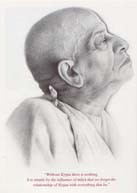
SRILA PRABHUPADA'S QUOTE OF THE DAY
I made this movement successful simply by love feast. They did not come
to hear Hare Krishna. They came for love feast. From very beginning, when
I was in 26 2nd Avenue, every Sunday I was giving nice foodstuff, at least
200 men. Daily at least more than 15, 20. I was cooking myself. That is
the beginning of my movement.
- Srila Prabhupada, Room Conversation on Farm Management -- December
10, 1976, Hyderabad
Sign-up to receive these quote HERE:
mailto:haribol@pacific.net.sg

Bhaktivedanta Vedabase Network ...
http://vedabase.net/


The Scientific - Mathematical
Proof for God's existence:
http://geocities.com/sector114

http://robot-hosting.com/php/login_nicholas.html
user name = guest
password = guest
(Collection of philosophical and mathematical proofs
for existence of God can be found in this site.)

Scientifically Philosophical Books for the layman
 ...
... ...
...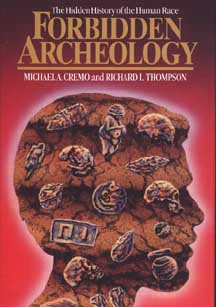 ...
...
Click on any of these books to read more about them and where to get
a copy
or contact your local temple for purchases
sample of Life
comes from Life HERE.pdf

Lotus Imprints - Preserving Prabhupada's Legacy - The
Publishing House of Hari Sauri dasa
http://www.lotusimprints.com/

Quotes from Shastra - scriptures
View using Balaram font

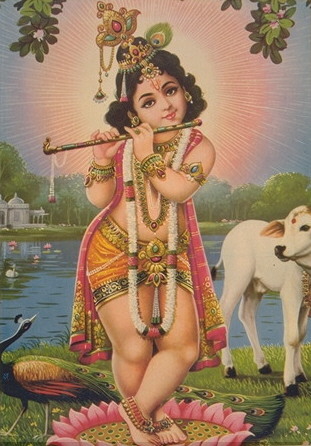

PutradA EkAdasii
Putradaa Ekaadasii - Pausha-shukla Ekaadasii:
The pious and saintly Yudhisthira Maharaj said, “Oh Lord,
You have so nicely explained to us the wonderful glories of the Saphalaa
Ekaadasi, which occurs during the dark fortnight (Krishna paksha)
of the month of Pausha (December – January). Now please be merciful to
me and explain to me the details of the Ekaadasi that occurs in the light
fortnight (Shukla or Gaura paksha) of this month. What is its name, and
what Deity is to be worshipped on that sacred day? Oh Purushottama, Oh
Hrishikesha, please also tell me how You can be pleased on this day?
Lord Sri Krishna then replied, “Oh saintly king, for the
benefit of all humanity I shall now tell you how to observe fasting on
the Pausha-shukla Ekaadasi.
As previously explained, everyone should observe
the rules and regulations of the Ekaadasi vrata, to the very best of their
ability. This injunction also applies to the Ekaadasi named Putradaa, which
destroys all sins and elevates one to the spiritual abode. The Supreme
Personality of Godhead Shri Narayana, the original personality, is the
worshippable Deity of the Ekaadasi, and for His faithful devotees He happily
fulfills all desires and awards full perfection. Thus among all the animate
and inanimate beings in the three worlds (lower, middle and higher planetary
systems), there is no better personality than Lord Narayana.
“Oh King, now I shall narrate to you the history
of Putradaa Ekaadasi, which removes all kinds of sins and makes one famous
and learned.
“There was once a kingdom named Bhadraavati, which
was ruled by King Suketumaan. His queen was the famous Shaibyaa. Because
he had no son, he spent a long time in anxiety, thinking, ‘If I have no
son, who will carry on my dynasty?’ In this way the king meditated in a
religious attitude for a very long time, thinking, ‘Where should I go?
What should I do? How can I get a pious son (putra)?
In this way King Suketumaan could find no happiness anywhere in his kingdom,
even in his own palace, and soon he was spending more and more time inside
his wife’s palace, gloomily thinking only of how he could get a son.
“Thus both King Suketumaan and Queen Shaibyaa were
in great distress. Even when they offered tarpana (oblations of water to
their forefathers), their mutual misery made them think that it was as
undrinkable as boiling water. They thus thought that they would have no
descendants to offer tarpana to them when they died and thus become lost
souls (ghosts). The king and queen were especially
upset to learn that their forefathers were worried that soon there would
be no one to offer them tarpana also.
“After learning of their forefathers unhappiness,
the king and queen became more and more miserable, and neither ministers,
nor friends, nor even loved ones could cheer them up. To the king, his
elephants and horses and infantry were no solace, and at last he became
practically inert and helpless.
“The king thought to himself, ‘It is said that without
a son, marriage is wasted. Indeed, for a family man with no son, both his
heart and his splendid house remain vacant and miserable. Bereft of a son,
a man cannot liquidate the debts that he owes his forefathers, the demigods
(devas) and to other human beings. Therefore every married man should endeavour
to beget a son; thus he will become famous within this world and at last
attain the auspicious celestial realms. A son is proof of the pious activities
a man performed in his past one hundred lifetimes, and such a person achieve
a long duration of life in this world, along with good health and great
wealth. Possessing sons and grandsons in this lifetime proves that one
has worshipped Lord Vishnu, the Supreme Personality of Godhead, in the
past. The great blessing of sons, wealth, and sharp intelligence can be
achieved only by worshipping the Supreme Lord, Shri Krishna. That is my
opinion.’
“Thinking thus, the king had no peace. He remained
in anxiety day and night, from morning to evening, and from the time he
lay down to sleep at night until the sun rose in the morning, his dreams
were equally full of great anxiety. Suffering such constant anxiety and
apprehension, King Suketumaan decided to end his misery by committing suicide.
But he realized that suicide throws a person into hellish conditions of
rebirth, and so he abandoned that idea. Seeing that he was gradually destroying
himself by his all consuming anxiety over the lack of a son, the king at
last mounted his horse and left for the dense forest alone. No one, not
even the priests and brahmins of the palace, knew where he had gone.
“In that forest, which was filled with deer and
birds and other animals, King Suketumaan wandered aimlessly, noting all
the different kinds of trees and shrubs, such as the fig, bel fruit, date
palm, jackfruit, bakula, saptaparnaa, tinduka, and tilaka, as well as the
shala, taala, tamaala, saralaa, hingotaa, arjuna, labheraa, bahedaa, sallaki,
karondaa, patala, khaira, shaka, and palaasha trees. All were beautifully
decorated with fruits and flowers. He saw deer, tigers, wild boar, lions,
monkeys, snakes, huge bull elephants in a rut, cow elephants with their
calves, and four tusked elephants with their mates close by. There were
cows, jackals, rabbits, leopards, and hippopotamuses. Beholding all these
animals accompanied by their mates and offspring, the king remembered his
own menagerie, especially his palace elephants, and became so sad that
he absentmindedly wandered into their very midst.
“Suddenly the king heard a jackal howl in the distance.
Startled, he began wandering about, looking around in all directions. Soon
it was midday, and the king started to tire. He was tormented by hunger
and thirst also. He thought, ‘What sinful deed could possibly have done
so that I am now forced to suffer like this, with my throat parched and
burning, and my stomach empty and rumbling? I have pleased the devas (demigods)
with numerous fire sacrifices and abundant devotional worship. I have given
many gifts and delicious sweets in charity to all the worthy brahmins
too. And I have taken care of my subjects as though they were my very own
children. Why then am I suffering so? What unknown sins have come to bear
fruit and torment me in this dreadful way?’
“Absorbed in these thoughts, King Suketumaan struggled
forward, and eventually, due to his pious credits, he came upon a beautiful
lotus bearing pond that resembled the famous Lake Maanasarova. It was filled
with aquatics, including crocodiles and many varieties of fish, and graced
with varieties of lilies and lotuses. The beautiful lotuses had opened
to the Sun, and swans, cranes and ducks swam happily in its waters. Nearby
were many attractive ashramas, where there resided many saints and sages
who could fulfill the desires of anyone. Indeed, they wished everyone well.
When the king saw all this, his right arm and right eye began to quiver,
a sakuna sign (for a male) that something auspicious was about to happen.
“As the king dismounted his horse and stood before
the sages, who sat on the shore of the pond, he saw that they were chanting
the holy names of God on japa beads. The king paid his obeisances and,
joining his palms, addressed them with glorified praises. Observing the
respect the king offered them, the sages said, ‘We are very pleased with
you, Oh king. Kindly tell us why you have come here. What is on your mind?
Please inform us what is your heart’s desire.’
“The king replied, ‘Oh great sages, who are you?
What are your names, surely your presence reveals that you are auspicious
saints? Why have you come to this beautiful place? Please tell me everything.’
“The sages replied, ‘Oh king, we are known as the
ten Vishvadevas (the sons of Vishva; Vasu, Satya, Kratu, Daksha, Kaala,
Kaama, Dhriti, Pururavaa, Maadrava, and Kuru). We have come here to this
very lovely pond to bathe. The month of Magha (Madhava mase) will soon
be here in five days (from the Magh nakshatra), and today is the famous
Putradaa Ekaadasii. One who desires a son should strictly observe this
particular Ekaadasii.’
“The king said, ‘I have tried so hard to have a
son. If you great sages are pleased with me, kindly grant the boon of having
a good son (putra).’
“ ‘The very meaning of Putradaa,’ the sages replied,
‘…is “giver of a putra, pious son.” So please observe a complete fast on
this Ekaadasii day. If you do so, then by our blessing – and by the mercy
of Lord Sri Keshava invested in us – surely you will obtain a son.’
“On the advice of the Vishvadevas, the king observed
the auspicious fast day of Putradaa Ekaadasii according to the established
rules and regulations, and on the Dvaadasii, after breaking his fast, he
paid obeisances again and again to all of them.
“Soon after Suketumaan returned to his palace and
united with his queen. Queen Shaibya immediately became pregnant, and exactly
as the Vishvadevas had predicted, a bright faced, beautiful son was born
to them. In due course of time he became famous as an heroic prince, and
the king gladly pleased his noble son by making him his successor. The
son of Suketumaan took care of his subjects very conscientiously, just
as if they were his own children.
“In conclusion, Oh Yudhisthira, one who wises to
fulfill his desires should strictly observe Putradaa Ekaadasii. While on
this planet, one who strictly observes this Ekaadasii will surely obtain
a son, and after death he will achieve liberation. Anyone who even reads
or hears the glories of Putradaa Ekaadasii obtains the merit earned by
performing an horse sacrifice. It is to benefit all humanity that I have
explained all this to you.”
Thus ends the narration of the glories of Pausha-shukla Ekaadasii,
or Putradaa Ekaadasii, from the Bhavishya Purana of Veda Vyaasadeva.
These stories have been summarized and slightly changed, abbreviated
or added to from how they are found in the celebrated book, "Ekadasi: The
Day of Lord Hari" 1986. HH Krishna Balaram Swami. Bhaktivedanta Institute
Press.
This particular Ekaadasii is to be found between Pages 33-38.

Makara Sankranti

last updated 10th January 2006
The Sun enters the Makara raasi (the zodiac sign of Capricorn
- the goat), on Sankranti day, signifying the onset of Uttarayana Punyakalam.
The following has been translated from an article in Sadachara
Vybhavam of the great Vaishnava devotee Sripad Madhwacharya.
Today is "Makara Sankranti" -- which is celebrated when
the Sun begins the northward journey, marking the beginning of the "uttaraayaNa
puNyakaalam". Sun enters the sign of "Makara", (Capricorn) from Cancer
at this time. (This is also called equinox, when the day and nights are
exactly the same). Starting this day, the duration of day starts to increase
until "dakshiNaayanam" comes. Makara Sankranti signifies two things. One
is the changing path of Sun and other is the beginning of "Uttarayana Punyakaala"
Makara literally means "Capricorn" and sankranti means "change" or 'sankramaNa'
literally means 'crossing'. On this day, it is said that Sun passes from
one Zodiac sign to another. A sankranti or sankramaNa marks the beginning
of every solar month in the Vedic calendrical system when Sun passes from
one sign to the other, it's the cusp of the months as astro-wallas call.
But, being solar based the change of January 14th or 15th of every year
is considered more sacred than any other month, as it is the beginning
of Uttarayana Punyakaala.
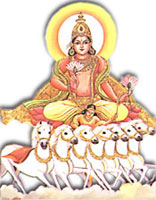
Lord Surya on His dazzling chariot that has thousands of
spokes and magnificent wheels, and driven by seven horses (seven colours
of the spectrum) begins His journey northward into the Makara Rasi, filling
our lives with light and getting rid of the darkness. This light
not only fills our material life and helps our plants grow at seeding time,
but also gets rid of our "internal" darkness, showing the path of self
realisation - moksha.
On this day, devotees prepare a dish made of green grams,
rice and jaggery (sarkkarai pongal) - representing Lord Narayana, Laxmi
and Their Divine love. The festival reminds us that we need to establish
that Divine Love within ourselves and give a direction to this "chanchala
buddhi" and fix it our Lord Narayana, who brings light in our lives.
This same festival is celebrated as Pongal in the
South of India. Harvest is brought home the new rice is then boiled
in milk to make the sweet called "chakrapongali", the special cuisine of
the eve. This harvest festival is celebrated for 3 days. The delicacy is
first offered to Sun God, the chief deity under worship, that is later
distributed to all as prasadam. The harvest is celebrated as being blessed
with Dhanyalakshmi and a splendid feast is shared by all after the Ishta
Devatha pujas.
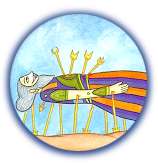
Traditionally, this period is considered an auspicious
time and the veteran
Bhishma of Mahabharata
chose to die during this period. Bhishma fell to the arrows of Arjuna.
With his boon to choose the time of his death, he waited on a bed of arrows
to depart from this world only during this period. Sri Bhishma Pitamaha
waited on the bed of arrows till the "uttaraayaNa punyakaalam" has arrived,
and then breathed once more, for the last time. It is believed that one
escapes the cycle of repeated birth and death, if one gives up one's body
on this day. The uttarAyaNa (norther course of the Sun) was traditionally
considered more auspicious than the dakshiNAyana (southern course of the
Sun). Over the years, this led some to believe that dying during dakshiNAyana,
the southern path of the sun, was inauspicious and did not lead to moksha
- release - liberation.
This belief
is cast aside in the Brahma-Sutras that the time of death is immaterial
in the case of the intelligent devotee. In those Sutras 4.2.19-20, it is
established that one who has knowledge of the Lord can die during any time;
the exaltations of uttarAyaNa are merely to praise meditation on the path
to Vaikuntha, which the wise devotees jIva takes upon death. This
divine path beginning with light, is presided upon by deities of greater
and greater brilliance, with uttarAyaNa being one of them. This marga -
path culminates in Vaikuntha, the state of moksha, and shastra says it
should be meditated upon daily by the yogi of devotion.
Sesame oil is used in making sweets and dishes, particularly
on this day. It is believed that sesame seeds are used for purificatory
purposed (or as being auspicious - "tila juhomi sarasaagum sapishhThaam
gandhaara mama chitteramanutu swaaha", "tila krishnaa tila shevataa tila
saumyaa vashaanugaa"...).
 So generally special
offerings of til (sesame) rice and corn (first harvest) are offered and
distributed, especially preparations of rice kitcheri with sesame and corn
are a prefered offering to the Lord on this day. In different parts of
India slight variations (gauna - local traditions prevail) but the gereral
observance is much the same. In the South of India they absorb themselves
in the festival of Pongal - new harvest festival.
So generally special
offerings of til (sesame) rice and corn (first harvest) are offered and
distributed, especially preparations of rice kitcheri with sesame and corn
are a prefered offering to the Lord on this day. In different parts of
India slight variations (gauna - local traditions prevail) but the gereral
observance is much the same. In the South of India they absorb themselves
in the festival of Pongal - new harvest festival.
Some devotees also have elaborate festivals offering six
kinds of sesame preparation in the service of the Lord on Sat-tila
ekadasi:
See the following links just below for some interesting
insights:
Other information about Makara sankranti - lincluding
local traditions - festivals:
The wide range of festivities can better be witnessed
by one along the countryside than in the urban localities. The festivities
last the whole of Dhanurmasam, ending with Sankranti.
Gobbemmalu – Young girls are seen to put up Gobbemmalu.
These are round balls of cow dung that are decorated with vermilion, turmeric
and coloured flowers. These are placed in the middle of the bright muggus
in the front yards of the dwellings and are worshipped with Navadhanyas
(nine types of grains) to welcome the Lakshmi, the Goddess of abundance
and prosperity. Spinsters worship for good husbands on the occasion. After
this, the women folk get gathered to sing and dance to the accompaniment
around these gobbis.
Many a traditional folk form add glory to the festive
scenario. Haridasulu (Madhwas) are seen singing eulogies of the Almighty
and seeking arms from the people in the early hours of the days. Gangireddu
Ata, is another festival where trained oxen dance to the tunes of the Nagaswaram
played by their master is a great attraction - probably not too many in
Auckland. Kommudasarulu & PittalaDora are other folklore that brighten
the days with their healthy humour - we can handle that......I got some
one liners.....
Kites – kites are seen soaring high in the sky on the
day of Makara Sankranti. This is symbolic of the existence of mankind,
with the kites depicting the human lives and the manza depicting the eternal
bond between us and the divine self. People however seem to correlate the
soaring kites with their high spirits on the eve of Makara sankranti. Competitions
held with kites of all sizes and shapes and the sharp edged manza draw
people on the terraces and in open grounds to witness the riot of colours
- fun for the gurukulis.
In some places they have the focus on the newly married
couples who are presented with special gifts and clothes.
Makara Sankranti - info:
http://www.indiainformation.com/festival/sankaranti.htm
Makara Sankranti and Ganga Sagar mela:
http://in.geocities.com/biswas_anirban/Makar.html
Sankranti
http://www.andhratoday.com/festival/sank.htm
Ganga Sagar mela - West Bengal tourist board:
http://www.travel-westbengal.com/fes_ganga.htm
Ganga Sagar Mela - A dip for Moksha:
http://www.indiaprofile.com/pilgrimage/gangasagarmela.htm
One month preceding Sankranti is called Dhanurmasam and
is also an auspicious period. People wake up early, complete their morning
ablutions and go around the streets singing devotional songs. Houses are
whitewashed and farmers clean their warehouses. Colourful Rangooli / muggulu
are drawn in the front yards of every house during this month. These artistic
floral designs are drawn on the floor with rice flour or fine powder of
limestone. These patterns are decorated with colors and adorned with marigold
placed on cowdung balls. Colourfully dressed young girls go round them
singing songs (gobbi patalu).

Ganga Sagara festival (Makara
Sankranti Mela)
Ganga Puja
The Bi-annual Paraya Festival
in Udupi
South Indian Pongal (Harvest
Festival) on Makara Sankrati:
Kumbha Mela - Magh Mela
The followers
of Madhwacharya's view of Makara Sankranti

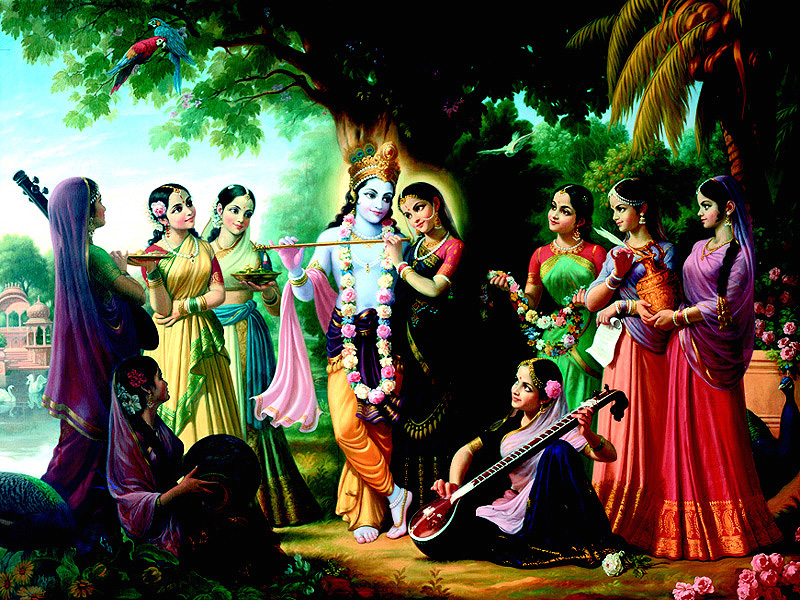
Pushya Abhisheka:
(Sri Krsna Pushya Abhisheka)
Krsna's Various Rasayatras:
Pushya Abhisheka:
Saradiya Rasayatra:
Vasanta panchami:
Vasanta Rasayatra:
Krsna Phula Dola, Salila Vihara:
Radha Govinda Jhulan Yatra :
Balaram Rasayatra:
On the purnima of the month of pausa (Narayana - December - January)(Srimad
Bhagavatam, 2:10:4, 'poSaNaM tad-anugrahaH."), the last day of the astrological
month (Pushyami nakshatra), one should bath the deity in five seers (or
pounds - 2.5kg approx') of ghee. The Hari Bhakti Vilasa says that on this
day one should rub ghee on the deity of Sri Krishna. Pusya of course
means nourishing, and this act of devotion, with ghee, which is very nourishing
is equivilent to the results of an asvamedha sacrifice.
Skanda Purana 2.2 chapter 42 describes Sri Krishna Pusya abhiseka as
one of the festivals observed for Lord Jagannath in Puri. This chapter
gives an elaborate description of the rituals for observing the festival.
In the 27th chapter text 99 of the same section of Skanda Purana the
pusya naksatra is also mentioned. There it is said that it was on a Thursday,
astami tithi, during sukla-paksa of the month of Vaishakha in conjuction
with the pusya-naksatra that that Lord Jagannath was installed in the original
temple in Puri.
' Krsna Pusya abhiseka -- During the morning puja,
or worship, the Deity or a salagrama is bathed in pure ghee. Srila Prabhupada
once explained the festival this way: "Krishna was just a toy in the hands
of the Gopis, so one day the Gopis decided that we shall decorate Him.
Pusyabhisheka means a ceremony to decorate the deity profusely with flowers,
ornaments, cloths. After there should be lavish feasting and a procession
through the streets, so that all the citizens should see how beautiful
Krishna appears." ' (Krsna-priya Devi Dasi, Vaisnava
Academy - Alachua)
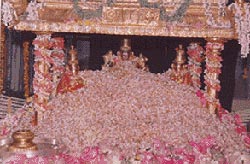
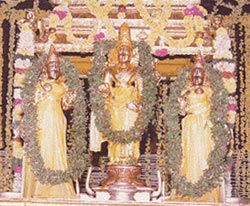
http://www.tirumala.org/pg_pushpa.htm
Tirupathy Tirumala Devasthanams, South India
 Sat-TilA
EkAdasii
Sat-TilA
EkAdasii
Sat-tilaa Ekaadasi:
Sri Daalbhya Rishi said to Palastya Muni, "When the spirit soul comes
in contact with the material energy, he immediately begins to perform sinful
activities, such as stealing, killing, and illicit sex. He may even perform
many other terrible deeds, such as killing a brahmin. Oh purest of personalities,
please tell me how these unfortunate souls may escape the punishment of
being sent to hellish regions of creation. Kindly inform me how, by giving
even a little in charity, one may be easily released from the reactions
of his sins."
Pulastya Muni replied, "Oh fortunate one, you have asked me an important
and confidential question, which not even Brahmaa, Vishnu, Shiva or Indra
has ever asked. Please listen very carefully to my answer.
"With the arrival of the month of Magh (January
- February), one should bathe, carefully control his senses by giving up
lust, anger, pride, jealousy, faultfinding, and greed, and meditate on
the Supreme Personality of Godhead Lord Sri Krishna. One should then gather
up some cow dung before it touches the ground and, after mixing it with
sesame seeds and cotton, form 108 balls. This should be done on the day
when the constellation of Purva-ashadha
nakshatra arrives. then one should follow the rules and regulations
of Sri Ekaadasii, which I shall now explain to you.
"After bathing, the person who intends to observe
Ekaadasii should worship the Supreme Lord. While praying to Lord Sri Krishna
by chanting His holy name, he should promise
to observe the Ekaadasii fast. He should remain awake overnight and perform
a homa (fire sacrifice). Then the devotee should perform an Arati
ceremony for the pleasure of the Lord - Who holds a conch, disk, club,
and so on in His hands - offering Him sandalwood paste to his feet, incense,
camphor, a bright ghee lamp, and delicious food preparations. Next the
devotee should offer the 108 balls of cow dung, sesame seeds, and cotton
wool into the sacred fire whilst chanting such holy names of the Lord as
Purusha sukta, and other names. Throughout the whole day and night he should
also observe the standard Ekaadasii vrata (fast, which in this case is
a fast from all kinds of grains and beans). On this occasion one should
offer the Lord pumpkin, coconut, and guava. If these items are unavailable,
betel nut may be substituted.
"The devotee should pray to Lord Sri Janardana,
the benefactor of all living beings, in this way; 'Oh Lord Sri Krishna,
You are the most merciful Personality of Godhead and the giver of liberation
to all fallen souls. Oh Lord, we have fallen into the ocean of material
existence. Please be kind to us. Oh lotus-eyed divinity, please accept
our most humble, affectionate and respectful obeisances. Oh protector of
the entire world, we offer You our humble respects again and again. Oh
Supreme Spirit, Oh Supreme One, Oh source of all our forefathers, may You
and Your eternal consort, Srimati Laxmi-devi,
please accept these humble offerings.'
"The devotee should then try to please a qualified
brahmin with a warm welcome, a pot full of water (purna kumbha), an umbrella,
a pair of shoes, and clothes (cloth - dhoti, and anga vaastra), requesting
him at the same time to bestow his blessings, by which one may develop
unalloyed love for Lord Sri Krishna. According to one's ability, one may
also donate a black cow to such a brahmin, particularly to one who is very
well versed in all the injunctions of the Vedic scriptures. One should
also offer him a pot full of sesame seeds.
"Oh exalted Daalbhya Muni, black sesame seeds
are especially suitable for formal worship and fire sacrifices while white
or brown ones are meant to be eaten by a qualified brahmin. One who can
arrange to give both kinds of sesame seeds (black and white or brown) especially
on this Sat-tilaa Ekaadasii day will be promoted to at least the heavenly
planets after leaving this present body, for as many thousands of years
as the number of seeds that would be produced if the seeds he donated were
sown in the ground and grew into mature, seed bearing plants.
"On this Ekaadasii a faithful person should (1)
bathe in the water mixed with sesame seeds, (2) rub sesame seed paste on
his body, (3) offer sesame seeds into the fire in sacrifice, (4) eat sesame
seeds, (5) give sesame seeds away in charity, (6) accept charitable gifts
of sesame seeds. These are the six (sat) ways in which sesame seeds (tilaa)
are utilised for spiritual purification on this Ekaadasii. Therefore it
is called Sat-tilaa Ekaadasii.
"The great Devarishi Naarad Muni once asked the
Supreme Personality of Godhead, Sri Krishna, 'Oh mighty armed Lord, Oh
You who are so affectionate to Your loving devotees, please accept my most
humble obeisances. Oh Yaadava, kindly tell me the result one obtains by
observing Sat-tilaa Ekaadasii.'
"Lord Sri Krishna replied, 'Oh best of the twice
born brahmins, I shall narrate to you an account of an incident I personally
witnessed. Long ago on earth there lived an old female brahmini who worshipped
Me every day with controlled senses. She very faithfully observed many
a fast, especially on special days honouring Me (My various appearance
days Janmaasthami, Rama-navami,
Vaman
Dwadasi, Nrisimha Chaturdasi, Varaha
Dwadasi, Gaura Purnima, etc. - Calendar)
and served Me with full devotion, devoid of any personal motive. Her rigorous
fasting made her quite weak and thin. She gave charity to brahmanas and
to young maidens (kanyas), and even planned to give away her house in charity.
Oh best of the brahmanas although this spiritually minded woman gave charitable
donations to worthy people, the odd feature of her austerity was that she
never gave food to brahmanas or the devas (demigods).
"'I began to reflect on this curious omission:
"This fine woman has purified herself by fasting on all the auspicious
occasions and by offering Me strict devotional worship. Therefore
she certainly has become eligible to enter My personal abode, which is
unattainable by ordinary persons." So I came down to this planet
to examine her, disguising Myself as a follower of Lord Shiva's, complete
with a garland of skulls draped around My neck and a begging pot (kumandalu)
in My hand.
"'As I approached her, she said toMe, "Oh respectful
one, tell me truthfully why You have come before me."
"'I replied, "Oh beautiful one, I have come to get
some sacred alms from you" - whereupon she angrily threw a dense lump of
mud into My begging pot! Oh Naarada Muni I simply turned around and
went back to My personal abode, astonished at this fine brahmani's peculiar
mixture of great magnanimity and stinginess.
"'At last this austere lady reached the spiritual
world in her self-same body, so great were her efforts at fasting and charity.
And because she had indeed offered Me a lump of mud, I transformed that
mud into a beautiful home. However, Oh Naradaji, this particular
house was just like that mud completely devoid of any edible grains, as
well as any furniture or ornamentation, and when she entered it she found
only an empty structure. She therefore approached Me and said with
great anger, "I have fasted repeatedly on so many auspicious occasions,
making my body weak and thin. I have worshipped You and prayed to
You in so many different ways for You are truly the master and protector
of all the universes. Yet despite all this there is no food or wealth
to be seen in my new home, Oh Janardana, please tell me. Why is this?"
"'I replied, "Please return to your house.
Sometime later the wives of the devas (demigods) will pay you a visit out
of curiosity to see the new arrival, but do not open your door until they
have described to you the glories and importance of Sat-tilaa Ekaadasii."
"'Hearing this, she returned to her house.
Eventually the devas' wives arrived there and in unison said, "Oh beautiful
one, we have come to have your darshan. Oh auspicious one, please
open the doorto your house and let us see you.
"'The lady replied, "Oh most dear ones, if you want
me to open this door, you will have to describe to me the merit one obtains
by observing the sacred fast of Sat-tilaa Ekaadasii." But to this
request, not even one of the wives responded.
"'Later, however, they returned to the house, and
one of the wives nicely explained the sublime nature of this sacred Ekaadasii.
And when the lady at last opened her door, they saw that she was neither
a demigoddess, a Gandharvi, a she-demon, nor even a Naga-patni. She
was simply an ordinary human lady.
"'From then on the lady observed Sat-tilaa Ekaadasii,
which awards ALL material enjoyment and liberation at the same time, as
it has been described to her. And she finally received the beautiful
furnishings and grains she had expected for her home. Moreover, her
once ordinary material body was transformed into a beautiful spiritual
form made of sac-cid-ananda (eternality, knowledge,and bliss), with a fine
complexion. So, by the mercy and grace of Sat-tilaa Ekaadasii, both
the lady and her new home in the spiritual world were at last radiantly
splendid and lustrous with gold, silver, jewels, and diamonds.
"'Oh Naradaji, a person should not ostentatiously
observe Ekaadasii out of greed, with the hope of attaining wealth dishonestly.
Selflessly, he should simply donate sesame seed, clothes, and food according
to his capacity, for by doing so he will achieve good health and exalted
spiritual consciousness, birth after birth. Ultimately, he will begiven
release from the bonds of this world (liberation) and admittance into the
Lord's supreme abode will be his to enjoy. That is my opinion, Oh
best of the demigods deva-rishis).'
"Oh Daalbhya Muni," Pulastya Rishi concluded, "one
who properly observes this wonderful Sat-tilaa Ekaadasii with great faith
become free from all kinds of poverty - spiritual, mental, physical, social,
and intellectual - as well as all kinds of ill luck and evil omens (sakuna).
Indeed, following this Ekaadasii fast by donating, sacrificing, or eating
sesame seeds frees one of all past sin, without a doubt. One need not wonder
how this happens. The rare soul who properly performs these acts
of charity in the right devotional mood, following the Vedic injunctions,
will become utterly free of all sinful reactions and go back to Godhead,
back home to the spiritual world."
Thus ends the narration of the glories of Magh-krishna
Ekaadasii, or Sat-tilaa Ekaadasii,
from the sacred Bhavishya-uttara Purana of Srila Krishna Dwaipayana
Vyaasa.
These stories have been summarised and slightly changed or abbreviated
from how they are found in the celebrated book, "Ekadasi: The Day of Lord
Hari" 1986. HH Krishna Balaram Swami. Bhaktivedanta Institute Press. pages
39-44.
Radha Krishna & gopis pics Copyright ©2005 The Bhaktivedanta
Book Trust
International, on the web at http://www.krishna.com.
Used with permission.
All pictures from Srimad Bhagavatam and Iskcon works - Copyright ©2005
The Bhaktivedanta Book Trust
International, on the web at .http://www.krishna.com/.
Used with permission.

Courtesy of http://www.vedabase.com/
used
with permission









![]()
![]()
![]()
![]()

![]()
![]()
![]()
![]()

![]()
![]()
![]()
![]()























